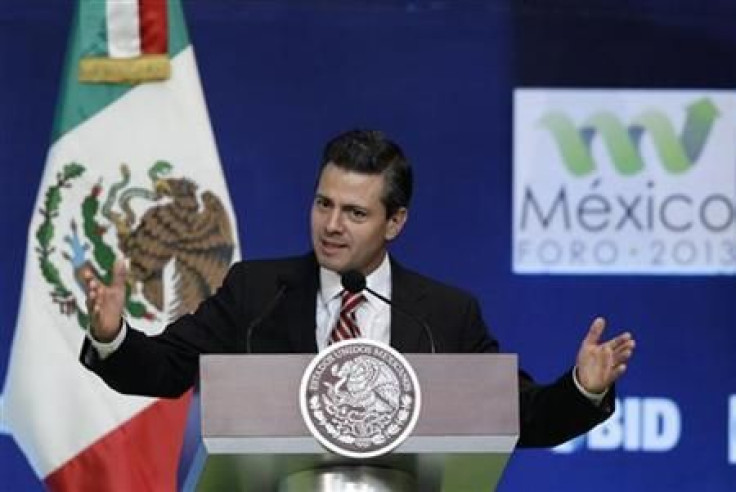
Mexican President Enrique Peña Nieto presented on Monday a long-awaited bill that proposes to change two articles of the nation's constitution in order to boost the efficiency of its state-owned oil company, Petróleos Mexicanos (Pemex). Since 1938, when then-president Lázaro Cárdenas moved to nationalize facilities of foreign oil operators and decreed that Pemex would enjoy exclusive rights to the exploitation of oil reserves, concessions of that black gold -- and even shared-risk contracts -- have been off-limits to investors. But in the face of huge losses by the company -- $3.8 billion in the last fiscal quarter -- politicians with Mexico's three main political parties all have reform on their mind. Here's five things to know about what Peña Nieto is proposing to do with Pemex.
1. It would reform Articles 27 and 28 of the 1917 Constitution.
"Regarding petroleum and solid, liquid or gaseous hydrocarbons ... neither concessions nor contracts will be granted, nor will any that have been granted persist and the Nation will carry out the exploitation of these products in the terms indicated by the respective regulatory statute," reads Article 27.
RELATED: Rafael Caro Quintero Accomplice Could Go Free Soon Despite Deep US Concerns
That article has been altered slightly on more than one occasion since the Constitution was originally passed - once by Lázaro Cárdenas himself in a revision which tightened the state's control over petroleum deposits, and again in 1960 by President Adolfo Lopez Mateos, who added nuclear energy to the list of energy reserves that belonged to the state and banned all risk-sharing contracts.
2. Peña Nieto wants you to know how closely his proposal resembles the constitution as it stood when Lázaro Cárdenas left office in 1940.
Peña Nieto said on Monday that his proposal "echoes word for word the text of constitutional article 27 in the text of president Lázaro Cárdenas," under which "concessions were prohibited and the right to exploit petroleum was granted to the State."
RELATED: Joaquin 'El Chapo' Guzman Tried To Buy Anti-Aircraft Missiles, Anti-Tank Weapons From US Citizens, Says Justice Department
"In addressing the lawmakers, President Cárdenas said 'the exclusion of the particulars of concession regimes does not imply that the nation abandons the possibility of admitting collaboration in private initiatives'," said the Mexican president.
3. It would open up oil production to "risk contracts" without conceding actual petroleum reserves to investors.
Under risk contracts, the owner of a resource -- in this, the Mexican nation -- transfers to a third party the risk of developing that resource in exchange for a compensation determined by a venture's degree of success. The owner doesn't lose its rights to the resource, but neither does it run the risks involved in developing them -- those risks are assumed by the third party charged with the task, because if it doesn't come off according to the terms specified by the contract, the third party gets no compensation for its work.
RELATED: Mexico Invests In Shell Oil Refinery As Pena Nieto Readies Plan
4. The general public might not look too kindly on the idea.
An August-September 2012 survey by a Mexican center for economic research and teaching (CIDE) found that 65 percent of Mexico opposes private investment in the energy sector.
5. Peña Nieto needs three-fourths of Mexican lawmakers on his side to get it passed.
Chances are he'll get the votes. He's assured those of his Partido Revolucionario Institucional (PRI) and the conservative Partido de Accion Nacional (PAN). The leftist Partido Revolucionario Democrata (PRD) is a different story. It has presented a plan which would aim to get Pemex back on its feet by cutting its tax burden and seeking to crack down on corruption and waste.
Andres Manuel López Obrador, two-time presidential candidate and leader of the PRD, has begun thrumming his war drum at the prospect of a constitutional change. "Oil is the property of the nation," he said last week, adding that the privatization of petroleum "betrays the country."
"We have to call things by their name. They are traitors."
His National Regeneration Movement (MORENA) has also presented a 15-point plan for reforming Pemex without touching the constitution.
© 2024 Latin Times. All rights reserved. Do not reproduce without permission.